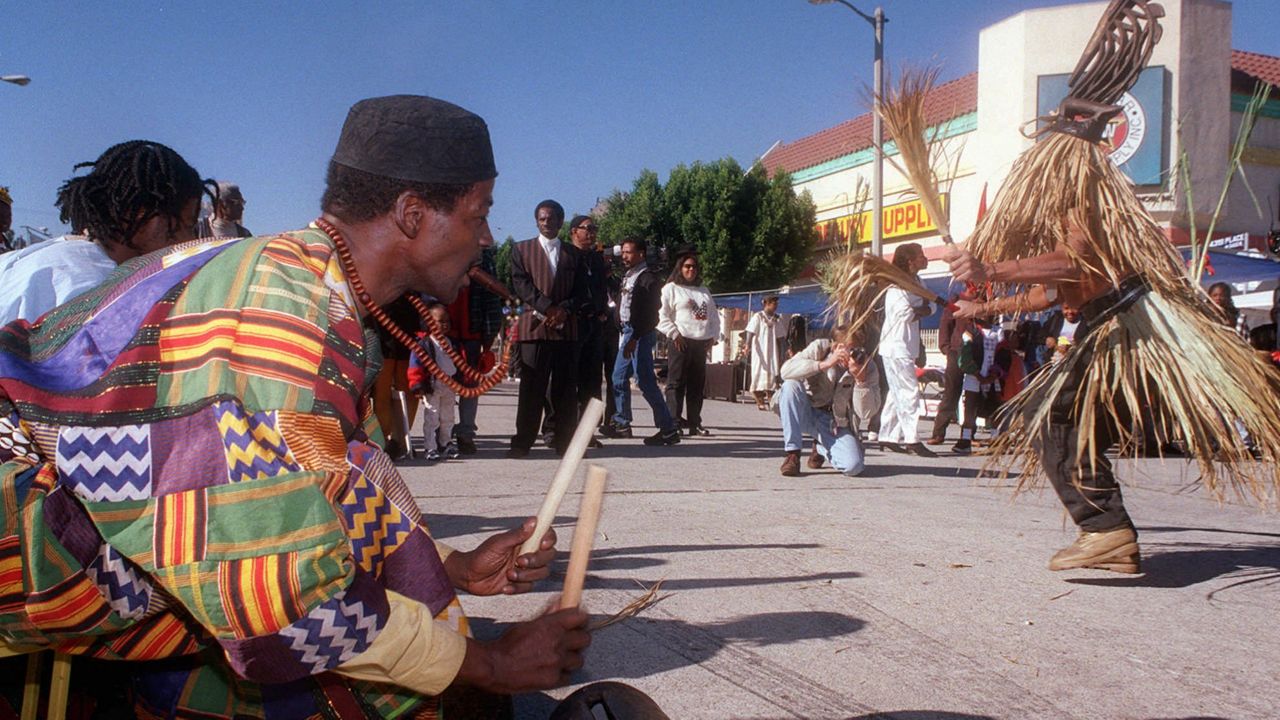LOS ANGELES (CNS) — The 45th edition of what organizers say is the world's oldest Kwanzaa procession was held Sunday in South Los Angeles to mark the start of the seven-day African-American festival.
The KwanZaa Gwaride began at Adams and Crenshaw boulevards, then headed south on Crenshaw Boulevard to Leimert Park, where a festival was held. It included pouring libation, the blessing of the grounds and drumming, jazz and spoken word performances.
The festival concluded with the lighting of the Umoja candle.
"This is our celebration. This is our new year," RW Akile, president of Kwanaa People of Color, which organizes the procession, told CBS2.
"As a pan-African holiday with ancient agricultural origins, Kwanzaa celebrates the good of the earth and carries within it a commitment to protect, preserve and share this good," Maulana Karenga wrote in his annual founder's message. "And Kwanzaa's modern origins in the Black Freedom Movement commits it to the achievement of liberation and social justice.
"Thus, in Kawaida philosophy, out of which Kwanzaa and the Nguzo Saba were created, environmental justice and social justice are inseparably linked in the moral imperative to achieve and ensure African and human good and the well-being of the world."
Karenga, chair of Africana Studies at Cal State Long Beach, created Kwanzaa in 1966 in what he called "an audacious act of self-determination."
Karenga describes the holiday as "a celebration of family, community and culture and celebrated by millions throughout the world African community. Kwanzaa brings a cultural message, which speaks to the best of what it means to be African and human in the fullest sense."
Kwanzaa's focus is the "Nguzo Saba," the Seven Principles — unity, self-determination, collective work and responsibility, cooperative economics, purpose, creativity and faith.
During the week, a candelabrum called a Kinara is lit, and ears of corn representing each child in the family are placed on a traditional straw mat.
African foods such as millet, spiced pepper balls and rice are often served. Some people fast during the holiday, and a feast is often held on its final night.
A flag with three bars — red for the struggle for freedom, black for unity and green for the future — is sometimes displayed during the holiday.
Kwanzaa is based on the theory of Kawaida, which espouses that social revolutionary change for Black America can be achieved by exposing Blacks to their cultural heritage.
Nightly Kwanzaa celebrations and workshops will be held at the African American Cultural Center of Long Beach from 4-7 p.m. Monday through Thursday.
Pasadena will conduct its 33rd annual Kwanzaa celebration from 11 a.m.- 12:15 p.m. Tuesday through Zoom. Registration can be made here.
To Los Angeles County Board of Supervisors Chair Holly J. Mitchell, the best way to celebrate Kwanzaa is "to educate themselves about Kwanzaa" and to understand its seven principles and what Karenga was focusing on in those principles "in terms of self-determination and community, how to build community, how to support community and how to support family."
"It really is about community and to have the opportunity to talk about and think about yourself and your role in the community," said Mitchell, who studied under Karenga at UC Riverside.



